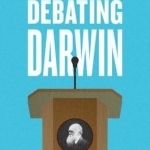
Forty Ways to Think About Architecture: Architectural History and Theory Today
Iain Borden, Murray Fraser and Barbara Penner
Book
How do we think about architecture historically and theoretically? Forty Ways to Think about...

Perfect/Imperfect: Embracing Natural Design in Bali
Book
The home designs of Alejandra Cicneros mark a significant departure from the tropical 'Bali' style...
Sanjay Patil
Book
Sanjay Patils tryst with architecture began in his early childhood as he soaked up the environs that...

Debating Darwin
Robert J. Richards and Michael Ruse
Book
Charles Darwin is easily the most famous scientist of the modern age, and his theory of evolution is...
Reggie Watts recommended Slacker (1991) in Movies (curated)

Chaturanga Astrology Horoscope and Compatibility
Lifestyle and Entertainment
App
Chaturanga — is your direct, personal and fully confidential chat with professional astrologers. ...

Jaxx Blockchain Wallet
Finance
App
Jaxx Blockchain Interface & Wallet Philosophy: 1. We never access or hold onto user funds. 2. We...

White as Silence, Red as Song
Book
International bestseller White as Milk, Red as Blood, has been called the Italian The Fault in Our...
original title Bianca come il latte rossa come il sangue

New Nebraska Heat (New Nebraska #2)
Book
Betrayed by her guardians. Defiled by monsters. Redeemed by love. Among the fangs, claws, and...
Reverse Harem Paranormal Romance
Rachel King (13 KP) rated Sweet Chic: Stylish Treats to Dress Up for Any Occasion in Books
Feb 11, 2019
The book opens with an explanation of Rachel's philosophy of baking. In the same way that a woman uses a little black dress as the foundation of her wardrobe, using accessories to dress it up or down, so too can a baker take a basic recipe for the base of a dessert and use simple alterations to create a complete "wardrobe" of desserts for any occasion. Chocolate chip cookie dough becomes white chocolate coconut cookies, oatmeal raisin cookies, snickerdoodles, or anything else a cook can dream up with a change in mix-ins. I used the oatmeal raisin cookie recipe and substituted in chocolate chips, cinnamon, and nutmeg, and they came out perfect!
The book is divided into three sections: Cookies, Cakes, and Confections. Each chapter in the three sections feature a basic recipe to build on, with names such as "The Crisp Oxford Shirt," "The A-Line Skirt," and "The Leather Jacket." Following the basic recipe of each chapter are several more example recipes of how to alter the base recipe to fit your needs. Vanilla Cake becomes Peanut Butter and Jelly Cupcakes, and Basic Tempered Chocolate becomes Cranberry Almond Bark.
The detail that Rachel goes into is also quite impressive. The beginning of the book teaches the basics of baked goods by reviewing all of the major ingredients used in baking - things like eggs, cocoa powder, and extracts - as well as essential equipment used, like a cake turntable. She then goes into the basic techniques of baking, simplifying them for even the most amateur of novices, and provides a pictorial guide for icing a cake and dipping things in chocolate. Each recipe is provided with very specific details on how to perform each step, as well as ideas at the end on how to dress it up further.
I loved this cookbook, and I would highly recommend it to anyone interested in baking, from the amateur to the experienced baker.

